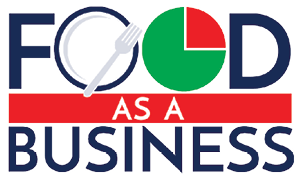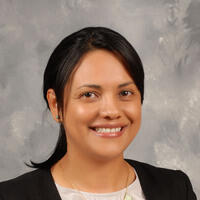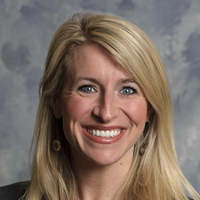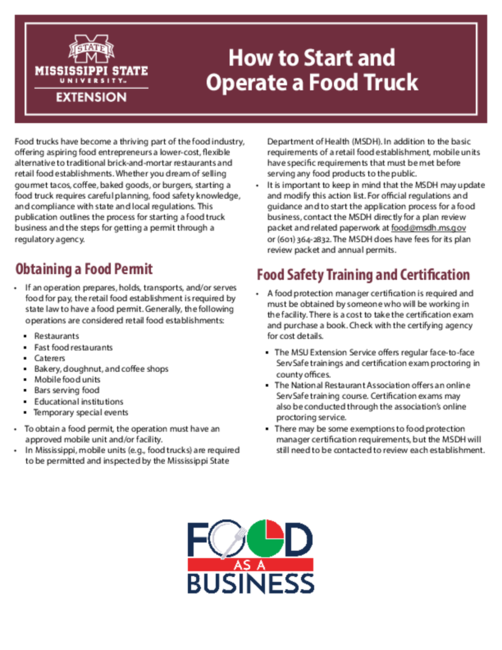P4135
How to Start and Operate a Food Truck

Food trucks have become a thriving part of the food industry, offering aspiring food entrepreneurs a lower-cost, flexible alternative to traditional brick-and-mortar restaurants and retail food establishments. Whether you dream of selling gourmet tacos, coffee, baked goods, or burgers, starting a food truck requires careful planning, food safety knowledge, and compliance with state and local regulations. This publication outlines the process for starting a food truck business and the steps for getting a permit through a regulatory agency.
Obtaining a Food Permit
- If an operation prepares, holds, transports, and/or serves food for pay, the retail food establishment is required by state law to have a food permit. Generally, the following operations are considered retail food establishments:
- Restaurants
- Fast food restaurants
- Caterers
- Bakery, doughnut, and coffee shops
- Mobile food units
- Bars serving food
- Educational institutions
- Temporary special events
- To obtain a food permit, the operation must have an approved mobile unit and/or facility.
- In Mississippi, mobile units (e.g., food trucks) are required to be permitted and inspected by the Mississippi State Department of Health (MSDH). In addition to the basic requirements of a retail food establishment, mobile units have specific requirements that must be met before serving any food products to the public.
- It is important to keep in mind that the MSDH may update and modify this action list. For official regulations and guidance and to start the application process for a food business, contact the MSDH directly for a plan review packet and related paperwork at food@msdh.ms.gov or (601) 364-2832. The MSDH does have fees for its plan review packet and annual permits.
Food Safety Training and Certification
- A food protection manager certification is required and must be obtained by someone who will be working in the facility. There is a cost to take the certification exam and purchase a book. Check with the certifying agency for cost details.
- The MSU Extension Service offers regular face-to-face ServSafe trainings and certification exam proctoring in county offices.
- The National Restaurant Association offers an online ServSafe training course. Certification exams may also be conducted through the association’s online proctoring service.
- There may be some exemptions to food protection manager certification requirements, but the MSDH will still need to be contacted to review each establishment.
Basic Requirements for a Mobile Unit
- All kitchen surfaces must be smooth and non-absorbent to allow for easy cleaning.
- Materials (floor, walls, ceiling, baseboards) should be suitable for food facilities.
- Raw or exposed wood, unfinished/unsealed tile, tin, or drywall is not allowed.
- It is recommended that kitchen area surfaces be sealed/non-absorbent and smooth for easy cleaning.
- It is recommended to have sliding screens or windows that close when there are no active customers.
- The mobile unit must have adequate ventilation for cooktop surfaces and fryers. It is recommended to contact the local fire department for detailed requirements.
- A water heater is required for hot water use. You must provide MSDH with the capacity of a hot water generator and/or the rate of delivery for a tankless water heater.
- Commercial-grade equipment is encouraged and preferred for use in mobile units.
- The mobile unit must have a fully enclosed food preparation space.
- All mobile units must have a three-compartment sink onboard for incidental utensil washing, even if a warewashing sink is available at the operations base and/or servicing area.
- Each compartment of the three-compartment sink must be large enough to completely submerge any wares the operation will have to wash.
- An approved sanitizer is required for use in the three-compartment sink.
- Approved sanitizers can be chlorine, quaternary ammonia, or another specified sanitizer.
- Approved sanitizer concentration test papers and/or test kits should be available to check sanitizer concentration.
Restrooms and Handwashing Sink
- All mobile units must have at least one dedicated sink for handwashing.
- All handwashing sinks must have soap, paper towels, handwashing signage, and a garbage can at all times.
- All sinks must have hot and cold fresh potable
running water. - If the mobile unit does not have a restroom, the unit must have convenient access to a restroom during all hours of operation.
- If the mobile unit has a restroom, the restroom door must be self-closing.
Food Handling for Mobile Units
- Policy generally requires mobile units to operate from a non-residential base of operations/servicing area/commissary.
- This is a permanent space where the operator can access anything that cannot be done on the mobile unit, such as filling the fresh potable water tank, emptying the wastewater tank, accessing a mop sink, storing supplies, warewashing, preparing food, and using the restroom.
- Many permitted mobile units work out servicing area access agreements with existing businesses or churches. These businesses must sign a servicing area agreement form and submit it to MSDH for approval.
- All food preparation, produce-washing, and dishwashing must take place on the mobile unit or in the approved servicing area/commissary. Cooking and/or food preparation may not be done in a private residence such as a home.
- All goods, food, and wares must be stored on the mobile unit at all times, even when not in service, and/or in the approved servicing area/commissary. Items may not be stored in a private residence such as a home.
Mop Sink
- U.S. Food and Drug Administration Food Code requires that facilities have a mop/service sink or a curbed cleaning area with a floor drain for the disposal of mop water and similar liquid waste. Mop water may not be discarded onto the ground, in a toilet, or in any other type of sink in the facility.
- If the unit does not have a mop sink, the operator must have a servicing area/commissary for washing garbage cans and using the mop sink. The servicing area/commissary must have an approved servicing area agreement form.
Potable Water, Ice, and Wastewater
- Facilities must have a potable water holding tank and a wastewater (gray water) holding tank. The wastewater tank must be 15 percent larger in volume than the potable water tank. For example, if the potable water tank is 20 gallons, the wastewater tank must be at least 23 gallons.
- The operator must fill the fresh potable water tank from an approved and routinely tested water source.
- The fresh potable source of water must be approved prior to operation. It is encouraged to use a public water supply.
- If a public water supply is not available, the source of water (e.g., private well) must meet additional parameters and testing to be used to fill the fresh potable water tank.
- Ice must be made from fresh potable water or purchased commercially.
- Ice scoops must be stored in a safe and sanitary manner.
- If purchasing ice from a commercial supplier, supplier information must be provided to MSDH.
- The operator must have an approved place to dump wastewater (gray water).
- Hoses that supply water for drinking and food preparation must be food grade.
- The wastewater hose must be a different color than the potable water hose.
References and Resources
Association of Food and Drug Officials Retail Food Resources
Conference for Food Protection
Mississippi State Department of Health (MSDH). 2024. Permits and Fees
Mississippi State Department of Health (MSDH). 2024. Retail Food Facilities
Mississippi State Department of Health (MSDH). 2024. Retail Food Permits and Inspections: Questions and Answers
Mississippi State Department of Health (MSDH). 2018. Application for a Food Facility Permit (PDF)
Mississippi State University Extension Service. 2025. ServSafe
National Restaurant Association
ServSafe – National Restaurant Association
U.S. Food and Drug Administration (FDA). 2022. Food Code
U.S. Food and Drug Administration (FDA). Food Code. 2022. Chart 4-D FDA Food Code Mobile Food Establishment Matrix

This work is supported by the Extension Risk Management Education Program, project award no. 2023-70027-40446, from the U.S. Department of Agriculture’s National Institute of Food and Agriculture.
Any opinions, findings, conclusions, or recommendations expressed in this publication are those of the author(s) and should not be construed to represent any official USDA or U.S. Government determination or policy.
The information given here is for educational purposes only. References to commercial products, trade names, or suppliers are made with the understanding that no endorsement is implied and that no discrimination against other products or suppliers is intended.
Publication 4135 (POD-09-25)
By Courtney Crist, PhD, Associate Extension Professor, Biochemistry, Nutrition, and Health Promotion; Elizabeth Canales, PhD, Associate Professor, Agricultural Economics; Rachael Carter, PhD, Extension Specialist II, Extension Center for Government and Community Development; and Lauren Colby Nickels, PhD, Extension Specialist I, Extension Center for Government and Community Development.
The Mississippi State University Extension Service is working to ensure all web content is accessible to all users. If you need assistance accessing any of our content, please email the webteam or call 662-325-2262.
Authors
-
 Associate Extension Professor
Associate Extension Professor -
 Associate Professor
Associate Professor- Agricultural Economics
-
 Extension Specialist I
Extension Specialist I- Ext Ctr for Government & Comm Devel
-
 Extension Specialist II
Extension Specialist II- Ext Ctr for Government & Comm Devel
